Unit 11 Rules Matter! Exploring the topic Reading strategies 课件(共41张PPT)
文档属性
| 名称 | Unit 11 Rules Matter! Exploring the topic Reading strategies 课件(共41张PPT) | 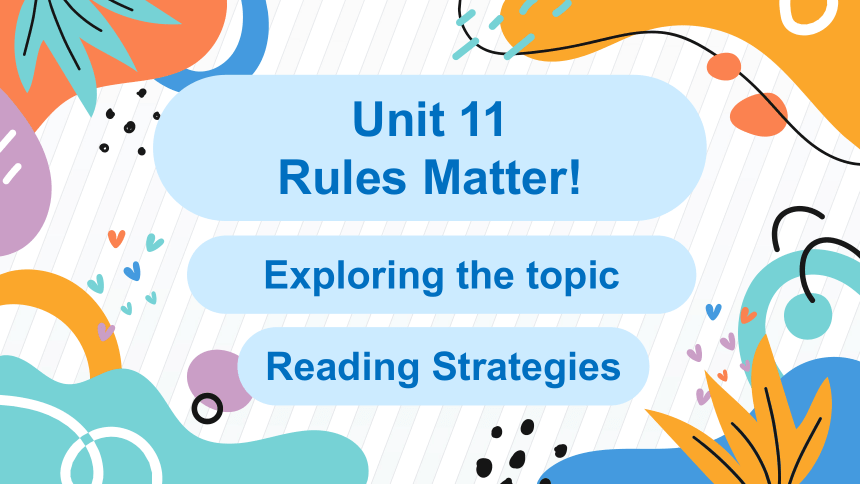 | |
| 格式 | pptx | ||
| 文件大小 | 4.9MB | ||
| 资源类型 | 教案 | ||
| 版本资源 | 仁爱科普版 | ||
| 科目 | 英语 | ||
| 更新时间 | 2025-06-13 19:05:19 | ||
图片预览

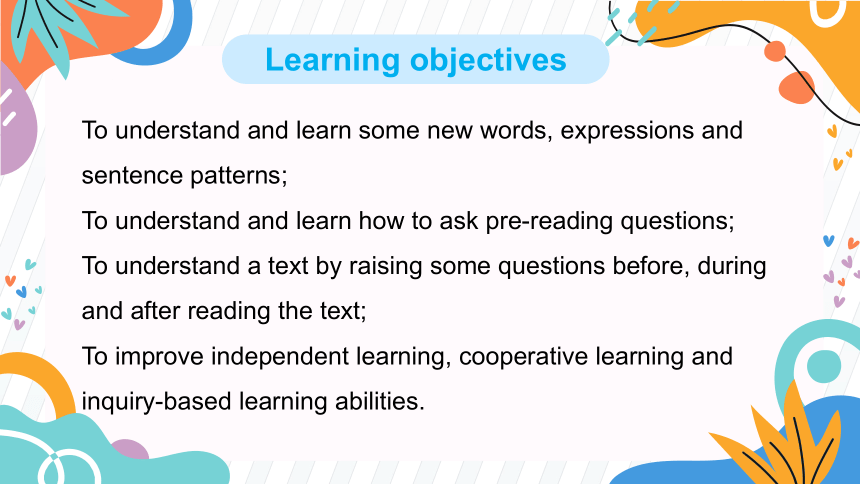
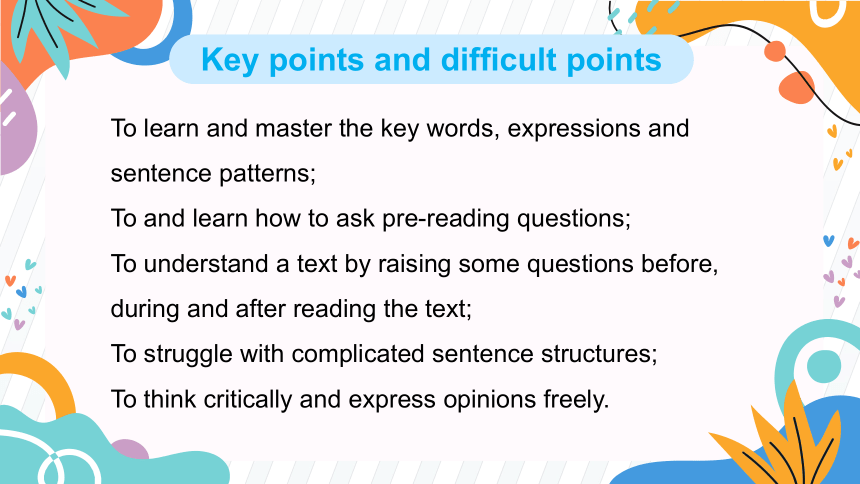
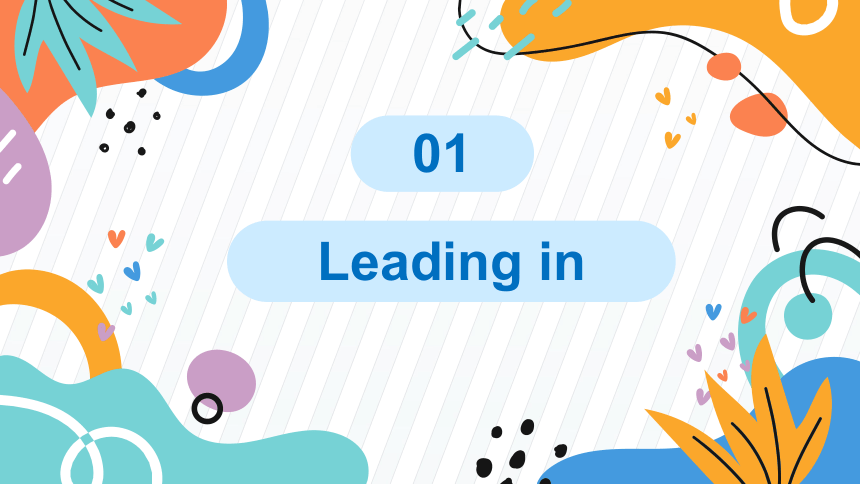
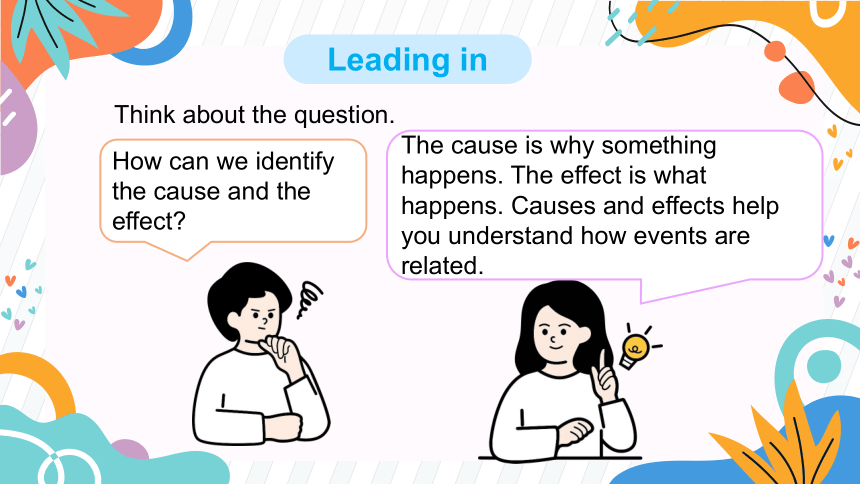
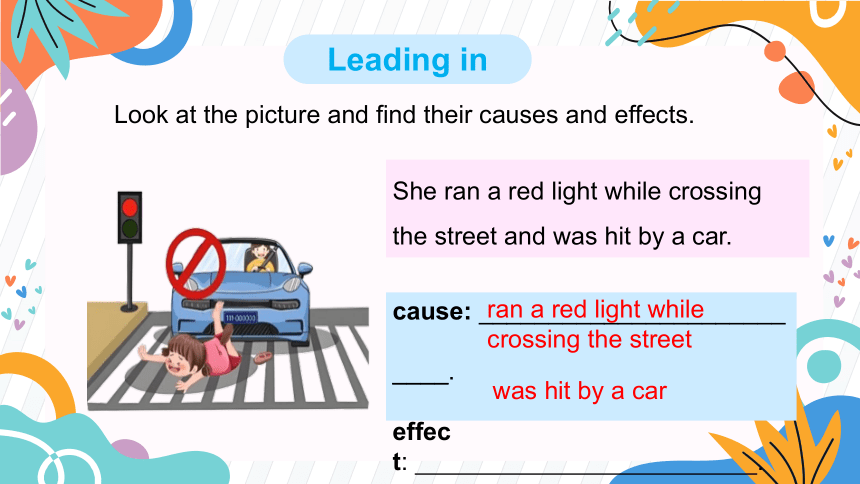
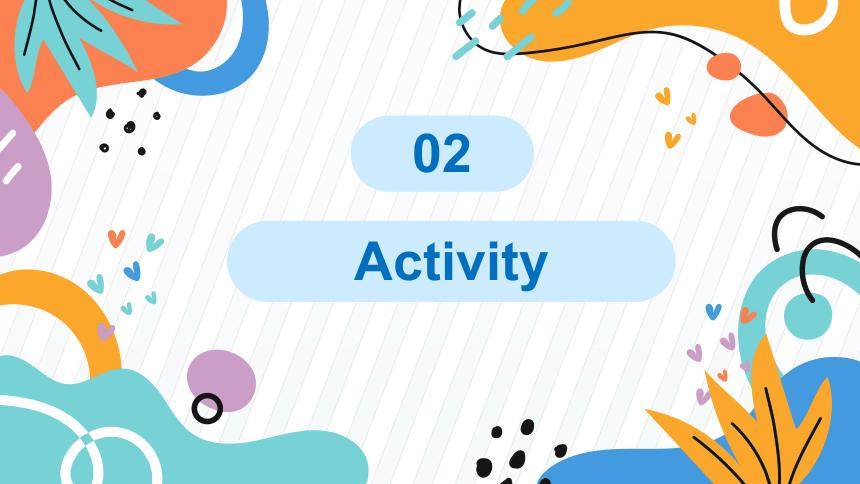
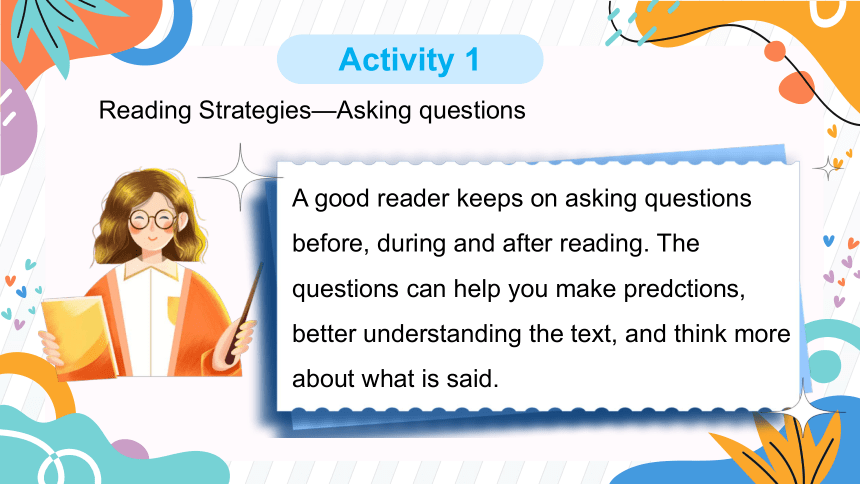

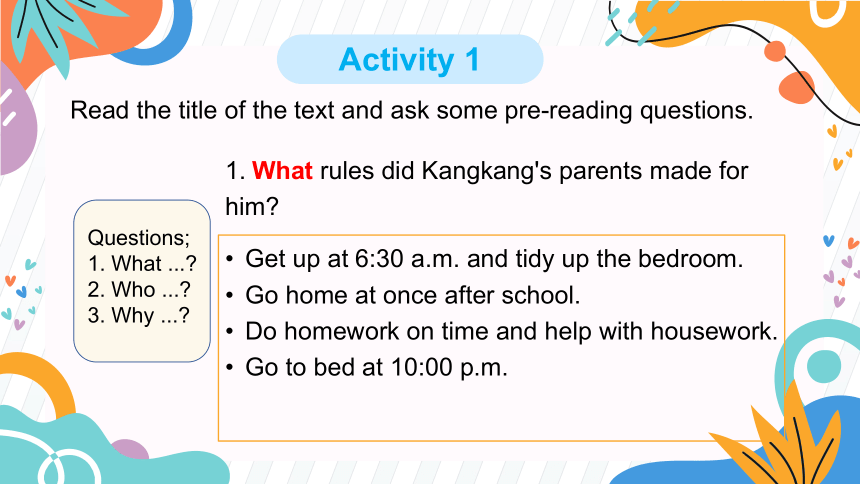

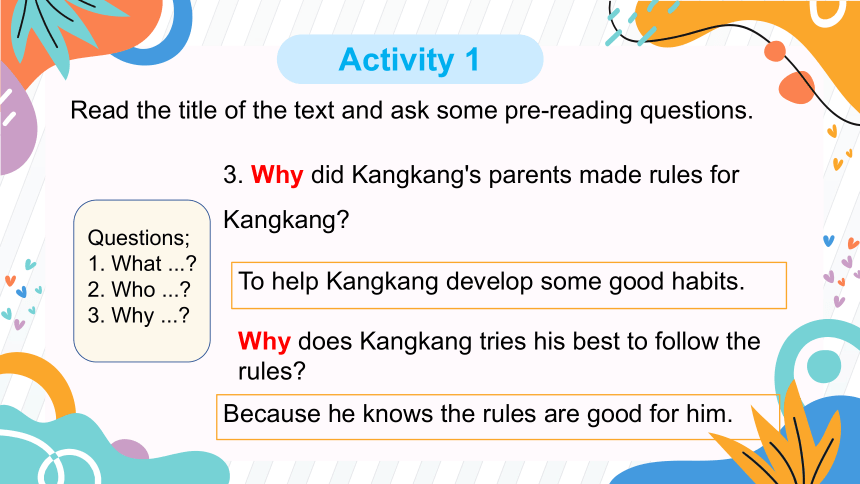
文档简介
(共41张PPT)
Exploring the topic
Reading Strategies
Unit 11
Rules Matter!
Learning objectives
To understand and learn some new words, expressions and sentence patterns;
To understand and learn how to ask pre-reading questions;
To understand a text by raising some questions before, during and after reading the text;
To improve independent learning, cooperative learning and inquiry-based learning abilities.
Key points and difficult points
To learn and master the key words, expressions and sentence patterns;
To and learn how to ask pre-reading questions;
To understand a text by raising some questions before, during and after reading the text;
To struggle with complicated sentence structures;
To think critically and express opinions freely.
Leading in
01
Leading in
Think about the question.
How can we identify the cause and the effect
The cause is why something happens. The effect is what happens. Causes and effects help you understand how events are related.
Leading in
Look at the picture and find their causes and effects.
She ran a red light while crossing the street and was hit by a car.
cause: ______________________
____.
effect: .
ran a red light while crossing the street
was hit by a car
Activity
02
Activity 1
Reading Strategies—Asking questions
A good reader keeps on asking questions before, during and after reading. The questions can help you make predctions, better understanding the text, and think more about what is said.
Read the title of the text and ask some pre-reading questions.
Activity 1
Kangkang’s Family Rules
To help Kangkang develop some good habits, his parents made some rules for him.
Get up at 6:30 a.m. and tidy up the bedroom.
Go home at once after school.
Do homework on time and help with housework.
Go to bed at 10:00 p.m.
Kangkang tries his best to follow the rules because he knows the rules are good for him.
Questions;
1. What ...
2. Who ...
3. Why ...
Activity 1
Questions;
1. What ...
2. Who ...
3. Why ...
Get up at 6:30 a.m. and tidy up the bedroom.
Go home at once after school.
Do homework on time and help with housework.
Go to bed at 10:00 p.m.
1. What rules did Kangkang's parents made for him
Read the title of the text and ask some pre-reading questions.
Activity 1
Questions;
1. What ...
2. Who ...
3. Why ...
Who needs to follow these rules
2. Who made the rules
Kangkang's parents.
Kangkang.
Read the title of the text and ask some pre-reading questions.
Activity 1
Questions;
1. What ...
2. Who ...
3. Why ...
3. Why did Kangkang's parents made rules for Kangkang
To help Kangkang develop some good habits.
Why does Kangkang tries his best to follow the rules
Because he knows the rules are good for him.
Read the title of the text and ask some pre-reading questions.
Read the text and check your pre-reading questions, and then ask more questions while you are reading and after you read the text.
Activity 2
About the rules
About Kangkang
About yourself
When/ What...
How/Why ...
Does ...
Do/Can I ...
What/Why should I ...
Pair work. Raise some questions before, during and after reading the text and ask your partner to answer the questions.
Activity 3
Alone at Home
On a Sunday afternoon, I was doing my homework at home. Suddenly, there was a knock at the door. I went to the door and looked through the peephole. I saw a stranger. I remembered our family rule—don’t open the door for strangers. I decided not to answer the door and went back to do my homework. A few minutes later, my mom called. She told me it was the delivery man and she was happy about it because I followed the family rule.
Pair work. Raise some questions before, during and after reading the text and ask your partner to answer the questions.
Activity 3
A: What did I do when I heard someone knocking on the door
B:
A: Why didn't I open the door
B:
A: Why is Mom so happy
B:
I went to the door and looked through the peephole.
I decided not to answer the door and went back to do my homework.
Because I remembered our family rule—don’t open the door for strangers.
Because I followed the family rule.
Asking questions
03
Asking questions
阅读策略——提问探究
提问在英语阅读中起着非常重要的作用,它能帮助学生更好地理解文本内容,激励学生积极主动地思考并培养学生的逻辑推理能力。下面是几种有效的提问方式:
1. 启发性提问:提出开放性的问题引导学生积极思考,激发他们的兴趣和好奇心。
例如:你对这个话题有什么了解 你有哪方面的问题需要了解
Asking questions
阅读策略——提问探究
2. 理解性问题:在学生初步阅读完文本后,可针对文本内容进行理解性的提问以检查学生对文本的理解程度。在提问时可借助what、who、where、when、how等疑问词进行针对性的提问,帮助学生进一步理解文章。
3. 探究性提问:通过提出一些需深入思考的问题让学生进一步分析文章,从而挖掘更多的细节信息。
例如:你认为这篇文章的主题是什么 你为什么这样认为
Asking questions
阅读策略——提问探究
4. 指导性问题:通过提出一些要求学生进行逻辑推理的问题,培养学生的推理能力。
例如:在深度阅读文本后可以问:文中作者的观点是什么 作者是如何证明自己的观点的 你同意作者的观点吗 为什么
5. 反思性问题:通过提出一些引发学生思考的问题,帮助学生反思自己的学习过程和策略,并找出改进方法。
例如:在完成短文阅读任务的过程中你遇到了什么困难 你是如何解决这些困难的
Vocabulary
04
Vocabulary
单词 词性 释义
housework n. 家务劳动;家务事
alone adv.,adj. 独自
peephole n. (墙或门上等的)窥视孔
stranger n. 陌生人
delivery n. 递送;传送;交付
Language points
05
Language points
1. Go home at once after school.
at once 意为“立刻;马上”,可与right now/right away互换
We must go home at once because it will rain soon.
我们必须马上回家,因为很快就要下雨了。
You can go right now for all I care.
你可以马上走,我才不在乎呢。
I need to see you, right away if possible.
我要见你,如果可能,马上。
Language points
2. Do homework on time and help with housework.
(1)help with 意为“帮助”
Mark always helps with the volunteer work.
马克总是帮着做志愿者工作。
help sb. with sth,意为“帮助某人做某事”,可与 help sb. (to) do sth.互换
Lili often helps her mother with housework.
= Lili often helps her mother do housework.
丽丽经常帮助她妈妈做家务。
Language points
2. Do homework on time and help with housework.
(2)housework,不可数名词,意为“家务劳动;家务事”,是由“house+work”构成的不可数名词。do(the)housework意为“做家务”,housework前可用little、much、a lot of等词或短语修饰
Children should help do housework at home.
孩子们在家应该帮助做家务。
类似的合成词还有:
homework 家庭作业 schoolwork 功课;学业
Language points
3. Kangkang tries his best to follow the rules because he knows the rules are good for him.
(1)follow the rules,动词短语,意为“遵守规则”,可与 obey the rules 互换
You must follow the rules if you join us.
如果你加入我们,你必须遵守规则。
You must learn and obey the rules of the road.
你必须学习和遵守交通规则。
Language points
3. Kangkang tries his best to follow the rules because he knows the rules are good for him.
(2)follow 的相关短语
① follow one's advice 听从某人的建议
You should follow the doctor's advice.
生病时你要听从医生的建议。
② follow sb. to do sth. 跟着某人做某事
Wang Bing followed his father to be a teacher.
王兵子承父业成为了一名老师。
Language points
4. Alone at Home
alone,副词/形容词,意为“独自”
The girl walked alone in the forest. She was a little scared.
这个女孩儿独自在森林行走,她有点儿害怕。
be alone with sb. sth.意为“与某人/某物独处”
Lili is not alone in helping others often.
并不只有丽丽一个人经常帮助他人。
Language points
5. On a Sunday afternoon, l was doing my homework at home.
此句的时态是过去进行时,表示过去某一具体时刻或某一段时间正在发生或进行的动作。其结构为“was/were+doing”
They were playing basketball from 9 to 10 yesterday morning.
他们昨天上午从 9点到 10 点一直在打篮球。
He was doing this to make me more relaxed.
他这么做是为了使我更放松。
Language points
6. Suddenly, there was a knock at the door.
knock(1)名词,意为“敲击声;敲门( 或窗户)击”
l heard a loud knock on the wall, so couldn't fall asleep.
我听到墙上传来巨大的敲击声,所以我就没法入睡了。
(2)knock 还可作动词,意为“敲;击”
Late that evening, there was a knock at the door.
那天深夜,有人敲过门。
Language points
6. Suddenly, there was a knock at the door.
(3)knock的常用短语
① knock on/at 敲击(门、窗等)
Someone knocks on/at the door while I am doing my homework.
我在写作业的时候有人敲门。
② knock down 撞到;击倒
The poor man was knocked down by a car.
这位可怜的男士被小汽车撞倒了。
Language points
7. l went to the door and looked through the peephole.
(1)look through,动词短语,意为“从……里面看”
l looked through the window and saw some kids playing football happily.
从窗户看过去,我看见一些孩子在开心地踢足球。
(2)look through 还可意为“浏览;快速查看”
l looked through the book quickly and found nothing interesting.
我快速地浏览了这本书,没有发现什么有趣的内容。
Language points
7. l went to the door and looked through the peephole.
(3)through 的相关短语
① run through 流经某地
The Changiiang River runs through many parts of China. 长江流经中国许多地区。
② go through 通过;经过;渡过
With the help of his parents and friends, he went through difficult times in the end.
在父母和好友的帮助下,他最终渡过了那段艰难的时光。
Exercise
06
Exercise
1. 他没有马上走向前门。
He didn't approach the front door ______________.
2. 我们的许多病人需要有人帮助穿衣。
Many of our patients need ______________ dressing.
3. 只要遵守那些条例,你就不会有什么麻烦了。
____________________, and you should have no problems.
4. 我不想和一个陌生人单独相处一整天。
I don't want to be ________ with a stranger for a whole day.
at once
help with
Follow the rules
alone
Exercise
5. 孩子们在学校附近的地上玩耍。
The kids ___________________ on ground near the school.
6. 他穿过花园小径去敲门。
He went up the garden path to ________________ the door.
7. 我走到一边往窗户里面望。
I went around to the side to ________________ the window.
8. 我不想再经历那样的事了。
I don't ever want to _____________ anything like that again.
were playing
knock on
look through
go through
Summary
07
Summary
Learn and master some new words, expressions and sentence patterns;
Understand and learn how to ask pre-reading questions;
Understand a text by raising some questions before, during and after reading the text;
Struggle with complicated sentence structures;
Think critically and express opinions freely.
Homework
08
Homework
Must-do: Review the key words, expressions and sentence patterns in today’s lesson.
Choose-to-do: Analyze a text by asking questions.
Thank you
Exploring the topic
Reading Strategies
Unit 11
Rules Matter!
Learning objectives
To understand and learn some new words, expressions and sentence patterns;
To understand and learn how to ask pre-reading questions;
To understand a text by raising some questions before, during and after reading the text;
To improve independent learning, cooperative learning and inquiry-based learning abilities.
Key points and difficult points
To learn and master the key words, expressions and sentence patterns;
To and learn how to ask pre-reading questions;
To understand a text by raising some questions before, during and after reading the text;
To struggle with complicated sentence structures;
To think critically and express opinions freely.
Leading in
01
Leading in
Think about the question.
How can we identify the cause and the effect
The cause is why something happens. The effect is what happens. Causes and effects help you understand how events are related.
Leading in
Look at the picture and find their causes and effects.
She ran a red light while crossing the street and was hit by a car.
cause: ______________________
____.
effect: .
ran a red light while crossing the street
was hit by a car
Activity
02
Activity 1
Reading Strategies—Asking questions
A good reader keeps on asking questions before, during and after reading. The questions can help you make predctions, better understanding the text, and think more about what is said.
Read the title of the text and ask some pre-reading questions.
Activity 1
Kangkang’s Family Rules
To help Kangkang develop some good habits, his parents made some rules for him.
Get up at 6:30 a.m. and tidy up the bedroom.
Go home at once after school.
Do homework on time and help with housework.
Go to bed at 10:00 p.m.
Kangkang tries his best to follow the rules because he knows the rules are good for him.
Questions;
1. What ...
2. Who ...
3. Why ...
Activity 1
Questions;
1. What ...
2. Who ...
3. Why ...
Get up at 6:30 a.m. and tidy up the bedroom.
Go home at once after school.
Do homework on time and help with housework.
Go to bed at 10:00 p.m.
1. What rules did Kangkang's parents made for him
Read the title of the text and ask some pre-reading questions.
Activity 1
Questions;
1. What ...
2. Who ...
3. Why ...
Who needs to follow these rules
2. Who made the rules
Kangkang's parents.
Kangkang.
Read the title of the text and ask some pre-reading questions.
Activity 1
Questions;
1. What ...
2. Who ...
3. Why ...
3. Why did Kangkang's parents made rules for Kangkang
To help Kangkang develop some good habits.
Why does Kangkang tries his best to follow the rules
Because he knows the rules are good for him.
Read the title of the text and ask some pre-reading questions.
Read the text and check your pre-reading questions, and then ask more questions while you are reading and after you read the text.
Activity 2
About the rules
About Kangkang
About yourself
When/ What...
How/Why ...
Does ...
Do/Can I ...
What/Why should I ...
Pair work. Raise some questions before, during and after reading the text and ask your partner to answer the questions.
Activity 3
Alone at Home
On a Sunday afternoon, I was doing my homework at home. Suddenly, there was a knock at the door. I went to the door and looked through the peephole. I saw a stranger. I remembered our family rule—don’t open the door for strangers. I decided not to answer the door and went back to do my homework. A few minutes later, my mom called. She told me it was the delivery man and she was happy about it because I followed the family rule.
Pair work. Raise some questions before, during and after reading the text and ask your partner to answer the questions.
Activity 3
A: What did I do when I heard someone knocking on the door
B:
A: Why didn't I open the door
B:
A: Why is Mom so happy
B:
I went to the door and looked through the peephole.
I decided not to answer the door and went back to do my homework.
Because I remembered our family rule—don’t open the door for strangers.
Because I followed the family rule.
Asking questions
03
Asking questions
阅读策略——提问探究
提问在英语阅读中起着非常重要的作用,它能帮助学生更好地理解文本内容,激励学生积极主动地思考并培养学生的逻辑推理能力。下面是几种有效的提问方式:
1. 启发性提问:提出开放性的问题引导学生积极思考,激发他们的兴趣和好奇心。
例如:你对这个话题有什么了解 你有哪方面的问题需要了解
Asking questions
阅读策略——提问探究
2. 理解性问题:在学生初步阅读完文本后,可针对文本内容进行理解性的提问以检查学生对文本的理解程度。在提问时可借助what、who、where、when、how等疑问词进行针对性的提问,帮助学生进一步理解文章。
3. 探究性提问:通过提出一些需深入思考的问题让学生进一步分析文章,从而挖掘更多的细节信息。
例如:你认为这篇文章的主题是什么 你为什么这样认为
Asking questions
阅读策略——提问探究
4. 指导性问题:通过提出一些要求学生进行逻辑推理的问题,培养学生的推理能力。
例如:在深度阅读文本后可以问:文中作者的观点是什么 作者是如何证明自己的观点的 你同意作者的观点吗 为什么
5. 反思性问题:通过提出一些引发学生思考的问题,帮助学生反思自己的学习过程和策略,并找出改进方法。
例如:在完成短文阅读任务的过程中你遇到了什么困难 你是如何解决这些困难的
Vocabulary
04
Vocabulary
单词 词性 释义
housework n. 家务劳动;家务事
alone adv.,adj. 独自
peephole n. (墙或门上等的)窥视孔
stranger n. 陌生人
delivery n. 递送;传送;交付
Language points
05
Language points
1. Go home at once after school.
at once 意为“立刻;马上”,可与right now/right away互换
We must go home at once because it will rain soon.
我们必须马上回家,因为很快就要下雨了。
You can go right now for all I care.
你可以马上走,我才不在乎呢。
I need to see you, right away if possible.
我要见你,如果可能,马上。
Language points
2. Do homework on time and help with housework.
(1)help with 意为“帮助”
Mark always helps with the volunteer work.
马克总是帮着做志愿者工作。
help sb. with sth,意为“帮助某人做某事”,可与 help sb. (to) do sth.互换
Lili often helps her mother with housework.
= Lili often helps her mother do housework.
丽丽经常帮助她妈妈做家务。
Language points
2. Do homework on time and help with housework.
(2)housework,不可数名词,意为“家务劳动;家务事”,是由“house+work”构成的不可数名词。do(the)housework意为“做家务”,housework前可用little、much、a lot of等词或短语修饰
Children should help do housework at home.
孩子们在家应该帮助做家务。
类似的合成词还有:
homework 家庭作业 schoolwork 功课;学业
Language points
3. Kangkang tries his best to follow the rules because he knows the rules are good for him.
(1)follow the rules,动词短语,意为“遵守规则”,可与 obey the rules 互换
You must follow the rules if you join us.
如果你加入我们,你必须遵守规则。
You must learn and obey the rules of the road.
你必须学习和遵守交通规则。
Language points
3. Kangkang tries his best to follow the rules because he knows the rules are good for him.
(2)follow 的相关短语
① follow one's advice 听从某人的建议
You should follow the doctor's advice.
生病时你要听从医生的建议。
② follow sb. to do sth. 跟着某人做某事
Wang Bing followed his father to be a teacher.
王兵子承父业成为了一名老师。
Language points
4. Alone at Home
alone,副词/形容词,意为“独自”
The girl walked alone in the forest. She was a little scared.
这个女孩儿独自在森林行走,她有点儿害怕。
be alone with sb. sth.意为“与某人/某物独处”
Lili is not alone in helping others often.
并不只有丽丽一个人经常帮助他人。
Language points
5. On a Sunday afternoon, l was doing my homework at home.
此句的时态是过去进行时,表示过去某一具体时刻或某一段时间正在发生或进行的动作。其结构为“was/were+doing”
They were playing basketball from 9 to 10 yesterday morning.
他们昨天上午从 9点到 10 点一直在打篮球。
He was doing this to make me more relaxed.
他这么做是为了使我更放松。
Language points
6. Suddenly, there was a knock at the door.
knock(1)名词,意为“敲击声;敲门( 或窗户)击”
l heard a loud knock on the wall, so couldn't fall asleep.
我听到墙上传来巨大的敲击声,所以我就没法入睡了。
(2)knock 还可作动词,意为“敲;击”
Late that evening, there was a knock at the door.
那天深夜,有人敲过门。
Language points
6. Suddenly, there was a knock at the door.
(3)knock的常用短语
① knock on/at 敲击(门、窗等)
Someone knocks on/at the door while I am doing my homework.
我在写作业的时候有人敲门。
② knock down 撞到;击倒
The poor man was knocked down by a car.
这位可怜的男士被小汽车撞倒了。
Language points
7. l went to the door and looked through the peephole.
(1)look through,动词短语,意为“从……里面看”
l looked through the window and saw some kids playing football happily.
从窗户看过去,我看见一些孩子在开心地踢足球。
(2)look through 还可意为“浏览;快速查看”
l looked through the book quickly and found nothing interesting.
我快速地浏览了这本书,没有发现什么有趣的内容。
Language points
7. l went to the door and looked through the peephole.
(3)through 的相关短语
① run through 流经某地
The Changiiang River runs through many parts of China. 长江流经中国许多地区。
② go through 通过;经过;渡过
With the help of his parents and friends, he went through difficult times in the end.
在父母和好友的帮助下,他最终渡过了那段艰难的时光。
Exercise
06
Exercise
1. 他没有马上走向前门。
He didn't approach the front door ______________.
2. 我们的许多病人需要有人帮助穿衣。
Many of our patients need ______________ dressing.
3. 只要遵守那些条例,你就不会有什么麻烦了。
____________________, and you should have no problems.
4. 我不想和一个陌生人单独相处一整天。
I don't want to be ________ with a stranger for a whole day.
at once
help with
Follow the rules
alone
Exercise
5. 孩子们在学校附近的地上玩耍。
The kids ___________________ on ground near the school.
6. 他穿过花园小径去敲门。
He went up the garden path to ________________ the door.
7. 我走到一边往窗户里面望。
I went around to the side to ________________ the window.
8. 我不想再经历那样的事了。
I don't ever want to _____________ anything like that again.
were playing
knock on
look through
go through
Summary
07
Summary
Learn and master some new words, expressions and sentence patterns;
Understand and learn how to ask pre-reading questions;
Understand a text by raising some questions before, during and after reading the text;
Struggle with complicated sentence structures;
Think critically and express opinions freely.
Homework
08
Homework
Must-do: Review the key words, expressions and sentence patterns in today’s lesson.
Choose-to-do: Analyze a text by asking questions.
Thank you
同课章节目录
